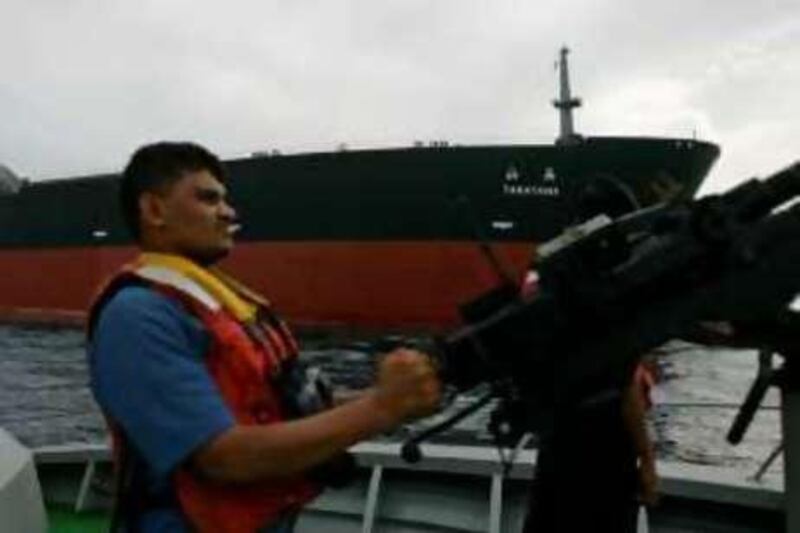SANA'A// Yemen has urged countries near the Horn of Africa to work together to fight piracy in the region as debate rages over the best means to combat the growing menace. There were 62 attacks in the first nine months of this year, with 13 vessels still being held by Somali pirates, according to the International Maritime Bureau Piracy Reporting Centre. The upsurge in attacks and a recent UN Security Council resolution calling on all countries with a stake in maritime safety off Somalia to send naval ships and military aircraft has led to fears from Arab nations that some countries might use piracy as an excuse to concentrate their presence in the region.
However, some analysts believe an absence of international help to take down the Somalian pirates could lead to further chaos in the region. "My office receives almost daily distress calls from vessels attacked by pirates; our resources are limited," said Col Lotf al Baraty, the director of Yemeni coastguard in Aden. "We are a five-year-old coastguard force with only 25 boats. We can do nothing to stop piracy in the Gulf of Aden. It is far away from our ability. Some companies have even asked us to escort their ships, but we cannot do that."
Col Baraty said pirates might take control of Somalia if the international community does not move quickly to address the problem. "Piracy acts started as isolated cases by Somali pirates hijacking small boats or ships. We have been concerned about this and we have tried to raise this concern to the international community. Unfortunately, there was no response. The situation is getting worse now," he said.
"Pirates are expanding their area. If the world community does not move, we are afraid they might control Somalia." Col Baraty said countries and shipping companies bowing to the pirates' pressure and paying ransoms was the reason behind the rise in piracy. "When these pirates hijack ships or boats and get millions of US dollars, they are encouraged. It has become a business and a well-organised operation covering a whole area in Somalia. With the ransom money they are able to buy better guns, better boats and recruit new pirates," he said.
Poor countries with limited resources, such as Yemen, Djibouti, Eritrea and Somalia, cannot combat piracy activities alone and need the help from Europe and North America, he said. "The international coalition forces are doing nothing to stop pirates; they say this is not their mission." Abu Bakr al Qirbi, Yemen's foreign minister, said the piracy problem in the Red Sea and Gulf of Aden is a question of security.
"It is the responsibility of the countries towering over these waterways to maintain their security. "If the Arab countries on the Red Sea work together, they will be able to attain the security of the Red Sea. We think the Arab countries that share concerns over the stability of this region should set up a strategy concerning the Red Sea, Bab el Mandeb and Arabian Sea security. This is their responsibility for this is a part of their national security at large," he said.
However, Mr Qirbi said the restoration of peace and stability to war-torn Somalia was the only solution to instability in the Horn of Africa and the increase in piracy attacks. Khalid al Wazeer, Yemen's transportation minister, said a regional centre to combat piracy would be established in collaboration with 20 countries and the International Maritime Organisation. A regional conference was due to be held in Yemen by the end of this month to discuss how to mobilise regional and international efforts to fight piracy but was postponed. Mr Wazeer said the postponement was requested by the IMO.
However, a western diplomat said a meeting attended by Yemeni officials and US and European ambassadors on Sept 10 revealed that Yemen had not prepared a clear vision on what should be done. "Yemeni officials need to clarify the situation and what can be the contribution of not only donors but also regional countries," the diplomat said. Mr Saleh Mujali, a maritime security expert, blamed the lack of response by Yemen on the absence of coastguard forces responding to piracy activities along with a lack of resources and poor co-ordination with the Yemeni navy.
"The coastguards kept themselves around the coast of Yemen without running regular patrols in the areas where pirates are active. Even when they move after they receive distress calls, they arrive late and pirates have already captured the ship," Mr Mujali said. The internationalisation of the waterways was probable if countries in the region failed to address piracy, he said. "It is possible to crack down on the pirates if there is international co-operation with the regional countries in terms of information exchange and security capacity building of these countries. Securing this region is important for everybody, mainly the Gulf countries, whose oil production is imported through the Red Sea," he said.
"If the countries positioned on the Red Sea and Gulf of Aden are not qualified enough to maintain their security, then internationalisation will be the alternative. "But big countries might exploit piracy to concentrate their presence in these waters under the pretext that international watercourses are under threat." malqadhi@thenational.ae





